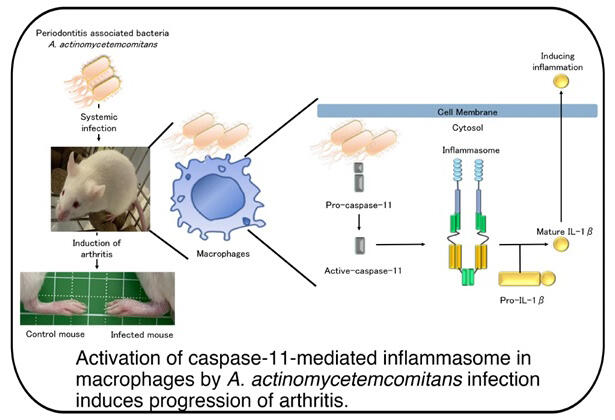A research group led by Professor Toshihiko Suzuki and Assistant Professor Tokuju Okano of the Department of Bacterial Pathogenesis, Infection and Host Response, Graduate School of Medical and Dental Sciences at Tokyo Medical and Dental University (TMDU, currently Institute of Science Tokyo), in collaboration with the Departments of Periodontology and Lifetime Oral Health Care Science of Graduate School of Medical and Dental Sciences and Department of Immune Regulation of Medical Research Institute at the same university, the University of Tokyo, and Osaka University, announced that they have clarified part of the mechanism by which periodontitis-associated bacteria exacerbate arthritis. Using a mouse model of arthritis, the group tested whether the periodontitis-associated bacterium Aggregatibacter actinomycetemcomitans exacerbated arthritis. They found that the bacterium exacerbated arthritis by acting on macrophages to enhance the systemic inflammatory response. The findings are expected to contribute to clarification of the pathogenic roles of other periodontitis-associated bacteria in systemic diseases. The results were published in the August 15 issue of the international scientific journal International Journal of Oral Science.

Provided by TMDU
Periodontal disease is a bacterial infection of the periodontal tissue caused by periodontitis-associated bacteria and the formation of bacterial biofilms. Recent studies have shown that the inflammatory response to periodontal disease extends beyond the periodontal tissue, affecting the entire body and contributing to systemic diseases such as diabetes, Alzheimer's disease, and rheumatoid arthritis. Although the involvement of A. actinomycetemcomitans, a periodontitis-associated bacterium, in the development and exacerbation of rheumatoid arthritis through the action of its toxin leukotoxin has been reported, the underlying mechanism remained unclear.
In this study, the research group induced arthritis via systemic infection of mice with A. actinomycetemcomitans and other periodontitis-associated bacteria and analyzed the pathophysiology. Neutrophils and macrophages were activated in the model mice infected with A. actinomycetemcomitans. The administration of a macrophage-depleting drug suppressed signs of arthritis exacerbation, indicating the importance of the macrophage action. Infection of mouse bone marrow−derived macrophages with A. actinomycetemcomitans induced IL-1β production and activation of inflammasomes, which are intracellular protein complexes involved in inflammatory responses.
Meanwhile, they confirmed that inflammasome activation was suppressed in macrophages derived from mice devoid of caspase-11, a component of the inflammasome. The importance of inflammasome activation was further validated in a mouse arthritis model. In the caspase-11-deficient arthritis model mice, arthritis exacerbation caused by A. actinomycetemcomitans infection was significantly reduced compared to that in the wild-type arthritis model mice. They also found that inflammasome activation in macrophages via A. actinomycetemcomitans infection can be suppressed by chloroquine (an antimalarial drug), polymyxin B (an antibiotic), and anti-CD11b antibody, which have been shown to be immunosuppressive. They also confirmed that arthritis exacerbation can be suppressed by administration of these agents to model mice.
These agents hold potential for application as therapeutic agents to control the exacerbation of arthritis. This is another example of the importance of oral hygiene.
Journal Information
Publication: International Journal of Oral Science
Title: Caspase-11 mediated inflammasome activation in macrophages by systemic infection of A. actinomycetemcomitans exacerbates arthritis
DOI: 10.1038/s41368-024-00315-x
This article has been translated by JST with permission from The Science News Ltd. (https://sci-news.co.jp/). Unauthorized reproduction of the article and photographs is prohibited.




